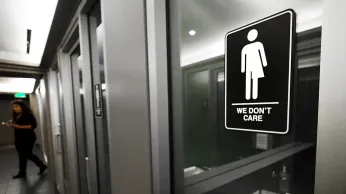
Jul 31
Trans College Student Challenges Idaho’s Anti-Trans Bathroom Law in Landmark Lawsuit
READ TIME: 2 MIN.
Idaho’s HB 264, which took effect on July 1, 2025, prohibits transgender individuals from using restrooms, changing rooms, and other gendered spaces in certain state-run facilities—including public colleges and universities—unless the facility aligns with their sex assigned at birth. The law also permits individuals to file lawsuits against state-run institutions that fail to enforce these restrictions. Supporters argue the law is necessary to protect privacy, but critics say it targets transgender people for discrimination and increases their risk of harm and exclusion in educational environments .
On July 31, 2025, two transgender individuals—including a college student currently enrolled at a public Idaho university—filed a federal lawsuit challenging the constitutionality of HB 264. The plaintiffs argue that the law discriminates against transgender people and violates their rights under the Equal Protection Clause of the Fourteenth Amendment. The legal filing also asserts that the law infringes on Title IX protections, which prohibit sex-based discrimination in federally funded education programs .
The lead plaintiff, a transgender college student, described the daily stress and exclusion caused by the law, stating that being barred from facilities that match their gender identity undermines their sense of safety and belonging on campus. LGBTQ+ advocacy organizations, including Lambda Legal and the American Civil Liberties Union of Idaho, are supporting the lawsuit and encouraging students impacted by HB 264 to share their stories .
The lawsuit comes at a time when bathroom access for transgender people remains a contentious legal and political issue across the United States. At least 11 states have enacted similar restrictions in public schools, and Idaho’s law is among the most recent to target public colleges and universities as well . Earlier this year, the U.S. Court of Appeals for the Ninth Circuit declined to block a related Idaho law requiring public school students to use restrooms aligned with their assigned sex at birth, ruling that the state’s interest in privacy likely outweighed constitutional challenges for the time being .
However, the same court previously blocked another Idaho law that barred transgender athletes from women’s and girls’ sports, finding that discrimination based on transgender status is a form of sex discrimination and likely unconstitutional. That sports-related case is currently on appeal to the U.S. Supreme Court .
LGBTQ+ rights organizations have strongly condemned HB 264, calling it a direct attack on transgender people’s dignity and equal access to education. Advocates note that being denied access to appropriate facilities can have severe mental health and academic consequences for transgender students. Calls for solidarity have been issued by campus LGBTQ+ groups and national organizations, emphasizing the importance of safe, inclusive educational environments .
The case is being closely watched nationwide, as its outcome could set a precedent for similar legislation in other states. Legal experts suggest that the federal court’s decision will likely influence ongoing debates about the intersection of privacy, equality, and the rights of transgender individuals in public spaces.
As the plaintiffs prepare for their day in court, advocates encourage members of the LGBTQ+ community and allies to remain informed, share their experiences, and support efforts to challenge laws that exclude or target transgender people .






